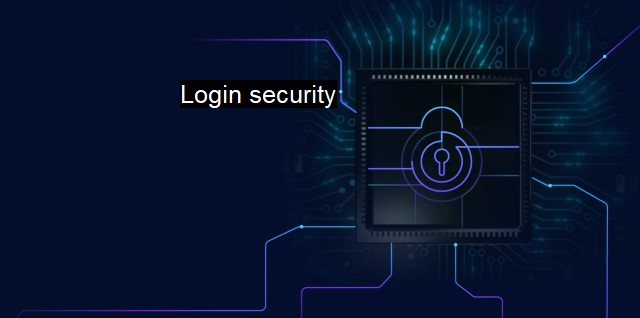What is Login security?
The Importance of Strong Login Security in Cybersecurity and Antivirus Practices to Prevent Unauthorized Access and Protect Sensitive Information and Resources
Login security signifies the protective measures employed to safeguard user login details from unauthorized or hostile access. It is a critical element in maintaining the integrity, confidentiality, and availability of the digital entities and the online presence of an individual or an organization.Login security is a specific aspect of cybersecurity, focusing primarily on protecting the data exchange that occurs when users need to provide authentication details, such as usernames, passwords, and other credentials, to access a certain system or network. Nonetheless, it also extends to broader protective spectra, concerning itself with ensuring secure sessions throughout the user's online experience.
Plentiful security threats course through the digital landscape challenging login security. The most common among them include phishing, keylogging, brute-force attacks, man-in-the-middle attacks, session hijacking, and cross-site scripting. These threats use various sophisticated techniques designed to fool users and exploit their vulnerabilities. phishing techniques try to trick users into surrendering their login credentials willingly, usually through deceptive emails or redesigned login pages.
Therefore, enforcing robust login security measures is crucial. Such measures mainly comprise strong password guidelines, multi-factor authentication, encryption tactics, login attempt limits, and constant security updates and patch installations.
Password policies need to encourage users to use unique, hard-to-crack and sophisticated passwords which shouldn't be reused across their other accounts. A strong password typically consists of at least 8 characters, including both upper and lower-case letters, numbers, and special symbols. Password managers can help users maintain such passwords and recollect them at need.
Multi-factor Authentication (MFA) or Two-factor Authentication (2FA) intensify login security by requiring more than just password input from the user. They may require something the user has (like a smartphone to receive SMS codes), something the user knows (like an answer to a security question), or even something the user is (like biometrics). This approach ensures an added layer of security, even if the user's password gets compromised, unauthorized entities would still find it difficult to gain access due to MFA/2FA.
Encryption plays a notable role in shielding data during transmission. It converts readable information into unintelligible data, which can only be reverted to its original form using a key. This makes sure that even if attackers manage to capture login credentials during transmission, they would be unable to utilize them.
Implementing login attempt limits can deter brute force attacks, where hackers venture to guess passwords using trial-and-error. Limiting the number of attempts crashes the intent of the hacker, shutting them off post recurrent wrong passwords inserted along quite a few attempts.
By ensuring constant security updates and patch installations for the system, companies can guard against new threats and ensure optimal security. Regular updates weed out bugs and lets your system brace up with advanced protective measures, thwarting the attacker's move.
Antivirus software runs side by side with these measures, parsing system data to detect and isolate potential threats, including keyloggers and viruses, which could compromise login credentials. They perform an ongoing security assessment, scanning files, conducting suspect behavior analysis, and quarantining or exterminating potential threats.
Login security operates as a formidable fortress protecting the users and their data. It delivers more secure, compliant access to applications and data and stands tall as an essential mechanism supporting cybersecurity as a whole. It has been manifesting proliferation, showing greater signs of elaboration and sophistication mirroring the growth of an ever more advanced and threatening digital ecosystem.

Login security FAQs
What is two-factor authentication and how does it enhance login security?
Two-factor authentication (2FA) is an extra layer of security that requires users to provide two different authentication factors, such as their password and a unique code sent to their mobile device, in order to log in. This significantly increases the difficulty for cybercriminals to gain unauthorized access to user accounts, enhancing login security.What is a password manager and how can it help with login security?
A password manager is a tool that securely stores login credentials in an encrypted database. This not only helps users generate strong passwords and keep track of them, but also protects against password reuse attacks, where cybercriminals try to gain access to multiple accounts using the same compromised password. By using a password manager, users can significantly enhance login security.What is phishing and how can it compromise login security?
Phishing is a social engineering attack where cybercriminals use fraudulent emails, messages or websites to trick users into divulging their sensitive information, such as login credentials. This can compromise login security, as cybercriminals can use the stolen credentials to gain unauthorized access to user accounts. To prevent phishing attacks, users should be cautious when opening emails or clicking links, and should always verify the legitimacy of the sender or website.How can antivirus software improve login security?
Antivirus software can improve login security by detecting and neutralizing malware, such as keyloggers or spyware, which can steal login credentials or other sensitive information from users. By regularly updating antivirus software and running regular scans, users can significantly reduce the risk of malware compromising their login security.| | A | | | B | | | C | | | D | | | E | | | F | | | G | | | H | | | I | | | J | | | K | | | L | | | M | |
| | N | | | O | | | P | | | Q | | | R | | | S | | | T | | | U | | | V | | | W | | | X | | | Y | | | Z | |
| | 1 | | | 2 | | | 3 | | | 4 | | | 7 | | | 8 | | |||||||